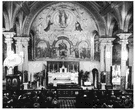sanctuary
Also found in: Thesaurus, Medical, Legal, Idioms, Encyclopedia, Wikipedia.
sanc·tu·ar·y
(săngk′cho͞o-ĕr′ē)sanctuary
(ˈsæŋktjʊərɪ)sanc•tu•ar•y
(ˈsæŋk tʃuˌɛr i)n., pl. -ar•ies.
sanctuary
Sanctuary
glory hole A container for the storage of ornaments, personal effects, and other paraphernalia. This term originally referred to a room where the war medals and decorations of a former soldier were stored. The expression is used today to describe any receptacle filled with useless items of sentimental value.
You can bring out your old ribbon-box … It’s a charity to clear out your glory-holes once in a while. (Adeline Whitney, We Girls, 1871)
ivory tower A condition of isolation or seclusion from worldly or practical affairs; a sheltered, protected existence removed from the harsh realities of life; an attitude of aloofness or distance from the mainstream of society. The original term appears to have been the French tour d’ivoire first used by the French literary critic Sainte-Beuve in reference to the French writer Alfred Victor de Vigny in his book Pensées d’Août (1837). The expression appeared in English in Brereton and Rothwell’s translation of Bergson’s Laughter (1911):
Each member [of society] must be ever attentive to his social surroundings … he must avoid shutting himself up in his own peculiar character as a philosopher in his ivory tower.
The term has spawned the noun ivory-tow-erism and the adjectives ivory-towerish and ivory-towered ‘impractical, theoretical, removed from reality.’
sanctum sanctorum A hideaway; a room or other place where one can seek refuge from his everyday concerns; a haven or sanctuary. Literally, the sanctum sanctorum (Latin, ‘sanctuary of sanctuaries’) is the Holy of Holies, a room in Biblical tabernacles and Jewish temples which only the high priest is allowed to enter, and then only on Yom Kippur, the Great Day of Atonement. By extension, sanctum sanctorum has been applied to any private, peaceful place such as a cabin in the woods or the den in a house which is not to be violated by intruders.
We went by appointment to the archbishop confessor’s and were immediately admitted into his sanctum sanctorum, a snug apartment … (Peter Beckford, Familiar Letters From Italy, 1834)
| Noun | 1. |  sanctuary - a consecrated place where sacred objects are kept sanctuary - a consecrated place where sacred objects are keptholy of holies, sanctum sanctorum - (Judaism) sanctuary comprised of the innermost chamber of the Tabernacle in the temple of Solomon where the Ark of the Covenant was kept Tabernacle - (Judaism) a portable sanctuary in which the Jews carried the Ark of the Covenant on their exodus |
| 2. | sanctuary - a shelter from danger or hardship safehold - a refuge from attack safe house - a house used as a hiding place or refuge by members of certain organizations shelter - a structure that provides privacy and protection from danger | |
| 3. |  sanctuary - area around the altar of a church for the clergy and choir; often enclosed by a lattice or railing sanctuary - area around the altar of a church for the clergy and choir; often enclosed by a lattice or railingarea - a part of a structure having some specific characteristic or function; "the spacious cooking area provided plenty of room for servants" choir - the area occupied by singers; the part of the chancel between sanctuary and nave church building, church - a place for public (especially Christian) worship; "the church was empty" |
sanctuary
sanctuary
nounsanctuary
[ˈsæŋktjʊərɪ] N (Rel) → santuario m (fig) (= refuge) → asilo m; (for wildlife) → reserva fto seek sanctuary → acogerse a sagrado
to seek sanctuary in → refugiarse en
to seek sanctuary with → acogerse a
sanctuary
[ˈsæŋktʃuəri] nsanctuary
sanctuary
[ˈsæŋktjʊərɪ] n (Rel) → santuario (fig) (Pol) (refuge) → asilo; (for wildlife, birds) → riservato seek sanctuary → cercare asilo